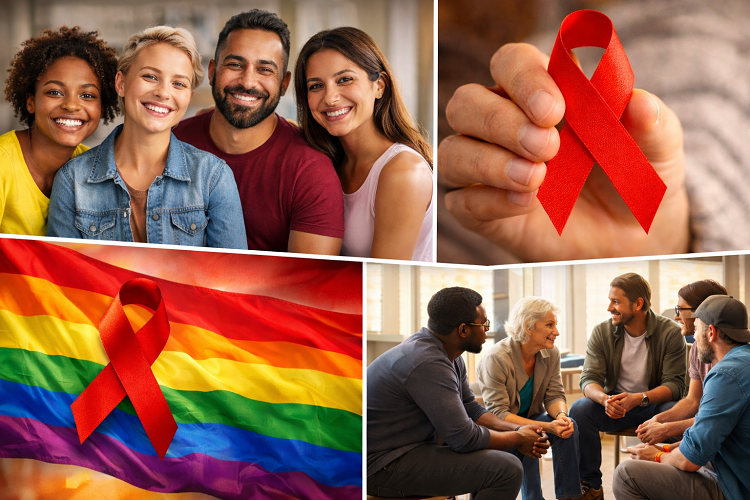Living with HIV can be a life-changing journey filled with emotional, physical, and social challenges. One of the biggest questions many people ask is: “Should I join HIV Chat Rooms or Support Groups?” The truth is, both offer valuable resources, but choosing the right one depends on your personality, lifestyle, and emotional needs.
In this guide, we’ll explore what HIV chat rooms and HIV support groups have to offer, highlight their differences, and help you decide which option fits your unique needs.
Understanding the Need for HIV Support
Being diagnosed with HIV doesn’t just affect your health, it impacts your mental well-being, relationships, and even your confidence. Many individuals find themselves isolated, unsure of who to talk to, or scared of facing stigma. This is where HIV chat rooms and HIV support groups step in, providing safe spaces to share experiences, guidance, and connect with others on the same journey.
Support is essential because HIV is not just a medical condition—it is an emotional and social experience too. Having someone to talk to who understands what you’re going through can reduce stress, improve adherence to treatment, and boost your quality of life. Both online and offline communities can play a huge role in helping you live openly and confidently with HIV.
What Are HIV Chat Rooms?
HIV chat rooms are virtual spaces where people living with HIV and those information can connect instantly. These platforms are often anonymous, making them attractive for individuals who may not feel comfortable sharing their HIV status in person.
Chat rooms typically function in real-time, allowing users to exchange messages, ask questions, or simply vent about their day. They may be moderated to ensure a safe environment, but the key benefit is the ability to connect with people across the globe at any time of the day or night.
Unlike structured meetings, chat rooms offer flexibility. You can log in when you need support, stay for a few minutes or hours, and engage at your own pace. For many, this is a lifeline in moments of loneliness or fear.
What Are HIV Support Groups?
On the other hand, HIV support groups are more structured gatherings—either in person or online—where people living with HIV meet to share experiences, challenges, and solutions. These groups may be run by healthcare providers, community organizations, or peer facilitators who understand the unique needs of HIV-positive individuals.
Support groups usually meet at specific times, offering a space where confidentiality is respected, and trust is built. Members often form deeper connections because the conversations are ongoing, intentional, and supportive. Unlike chat rooms, support groups may also include educational sessions, guest speakers, or resources related to treatment, lifestyle, and mental health.
HIV Chat Rooms: Benefits and Limitations
Benefits of HIV Chat Rooms
One of the most attractive features of chat rooms is immediate accessibility. You can join from anywhere in the world, at any time. This makes them especially valuable for individuals in rural areas or places where in-person HIV support is hard to find.
Chat rooms also provide anonymity, which can be empowering if you’re not ready to disclose your HIV status publicly. You can ask sensitive questions, share your struggles, or simply read others’ stories without fear of judgment.
Limitations of HIV Chat Rooms
However, chat rooms do have limitations. Because they are informal, the quality of support can vary. Not everyone may be respectful or knowledgeable, and while moderators try to maintain safety, misinformation can sometimes spread.
Additionally, the anonymity that chat rooms offer can also mean less accountability. Unlike support groups, where members build trust over time, chat room conversations may feel fleeting or shallow.
HIV Support Groups: Benefits and Limitations
Benefits of HIV Support Groups
Support groups provide a sense of community and belonging that can be harder to establish in anonymous chat rooms. When you meet regularly with the same group, you develop trust, friendships, and deeper conversations.
Another benefit is professional guidance. Many HIV support groups are facilitated by trained counselors, social workers, or healthcare providers who ensure accurate information and provide mental health tools. This makes support groups a reliable source of emotional and practical help.
Limitations of HIV Support Groups
Support groups, however, may not be as convenient. They often meet at scheduled times, which might not fit everyone’s lifestyle. Attending in person may also require travel, which could be difficult for people in remote areas or those worried about stigma in their community.
For some, privacy concerns can also be a barrier. Walking into a support group meeting might feel intimidating if you’re not ready to openly acknowledge your HIV status in front of others.
Choosing Between HIV Chat Rooms and Support Groups
The choice between HIV chat rooms and HIV support groups really depends on your personality and comfort level.
If you value flexibility, anonymity, and instant access, HIV chat rooms might be the right fit. They allow you to reach out whenever you feel overwhelmed or lonely without needing to make a commitment.
If you prefer deeper, more structured connections, HIV support groups can provide a more meaningful experience. With regular meetings, you’ll gain a sense of belonging and consistent emotional support that chat rooms may not always offer.
For many people, the best solution is a combination of both—using chat rooms for quick support and joining a group for deeper connections.
The Role of Technology in HIV Support
Technology has transformed how people with HIV connect. Decades ago, support was limited to in-person groups, but now, digital platforms have opened doors for individuals worldwide. HIV chat rooms, forums, and even social media communities are bridging gaps for those who can’t attend physical meetings.
Mobile apps dedicated to HIV awareness and dating also provide safe spaces to meet partners who understand the challenges of living with HIV. This shift shows that technology isn’t replacing support—it’s expanding it.
How to Find Safe HIV Chat Rooms
If you’re considering joining a chat room, safety should be your priority. Look for platforms that are moderated, respect privacy, and discourage stigma. Some websites are designed specifically for people living with HIV, ensuring you’re in a community that understands.
Always remember not to share personal details like your full name, address, or financial information in chat rooms. Focus on emotional support, information exchange, and connection, while keeping your privacy intact.
How to Find Reliable HIV Support Groups
Finding the right support group may take some research, but it’s worth the effort. You can start by asking your healthcare provider, local NGOs, or HIV clinics if they run or recommend support groups.
Many organizations now offer virtual support groups, allowing you to participate from home via video calls. These groups balance the structure of in-person meetings with the convenience of online access. Look for groups that align with your values, whether it’s LGBTQ+ friendly, faith-based, or focused on mental health.
Emotional Benefits of HIV Communities
Both HIV chat rooms and support groups provide emotional relief in different ways. Chat rooms give quick reassurance, while support groups offer a stable, long-term network of people who genuinely understand your journey.
These communities help reduce feelings of shame or loneliness by reminding you that you are not alone. Sharing your story—or listening to others—can inspire hope and resilience. For many, this emotional connection is as important as medical treatment.
Which Option Fits Your Needs Best?
When deciding whether HIV chat rooms or support groups are best for you, ask yourself the following:
- Do I want instant, anonymous access to people like me?
- Am I ready to connect more deeply and commit to regular meetings?
Do I prefer flexibility or structure in my support system? - How important is privacy in my current situation?
There is no right or wrong choice. Some people thrive in the anonymity of chat rooms, while others find healing in face-to-face or structured group settings. What matters most is choosing a space that helps you feel safe, supported, and empowered.
Final Thoughts: Building Your HIV Support System
Living with HIV is a journey, and no one should walk it alone. Whether you lean toward HIV Chat Rooms or HIV Support Groups, both provide invaluable ways to connect, share, and grow. Each offers unique benefits and limitations, so the best choice depends on your personal needs and lifestyle.
Ultimately, the goal is the same—to give you the support, encouragement, and knowledge you need to live fully and confidently. By exploring both chat rooms and support groups, you can create a support system that works for you, ensuring that you never feel isolated on your journey.




